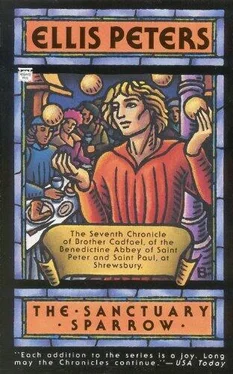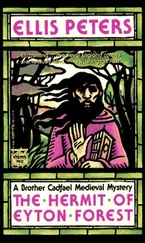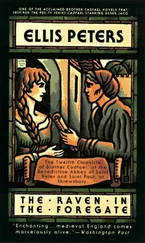Ellis Peters - The Sanctuary Sparrow
Здесь есть возможность читать онлайн «Ellis Peters - The Sanctuary Sparrow» весь текст электронной книги совершенно бесплатно (целиком полную версию без сокращений). В некоторых случаях можно слушать аудио, скачать через торрент в формате fb2 и присутствует краткое содержание. Жанр: Старинная литература, на английском языке. Описание произведения, (предисловие) а так же отзывы посетителей доступны на портале библиотеки ЛибКат.
- Название:The Sanctuary Sparrow
- Автор:
- Жанр:
- Год:неизвестен
- ISBN:нет данных
- Рейтинг книги:5 / 5. Голосов: 1
-
Избранное:Добавить в избранное
- Отзывы:
-
Ваша оценка:
- 100
- 1
- 2
- 3
- 4
- 5
The Sanctuary Sparrow: краткое содержание, описание и аннотация
Предлагаем к чтению аннотацию, описание, краткое содержание или предисловие (зависит от того, что написал сам автор книги «The Sanctuary Sparrow»). Если вы не нашли необходимую информацию о книге — напишите в комментариях, мы постараемся отыскать её.
The Sanctuary Sparrow — читать онлайн бесплатно полную книгу (весь текст) целиком
Ниже представлен текст книги, разбитый по страницам. Система сохранения места последней прочитанной страницы, позволяет с удобством читать онлайн бесплатно книгу «The Sanctuary Sparrow», без необходимости каждый раз заново искать на чём Вы остановились. Поставьте закладку, и сможете в любой момент перейти на страницу, на которой закончили чтение.
Интервал:
Закладка:
“And it may still be so,” admitted Hugh, parting from Cadfael on the bridge some twenty minutes later. “Enough to tempt any poor wretch with but two coins to rub together. Whether he had any such thought in his head before the candle shone on our friend’s hoard or no. Equally, I grant the lad may not even have realised what lay beneath his hand, or seen anything but his own need and the thin chance of getting a kinder reception from the goldsmith than from that ferocious mother of his. He may have crept away thanking God for his penny and never a thought of wrong. Or he may have picked up a stone or a stave and turned back.”
At about that same time, in the street outside Saint Mary’s church, which was the common ground for exchanging civilities and observing fashions on a fine Sunday morning after Mass, Daniel and Margery Aurifaber in their ceremonial progression, intercepted by alternate well-wishers and commiserators—wedding and robbery being equally relished subjects of comment and speculation in Shrewsbury—came face to face with Master Ailwin Corde, the wool-merchant, and his wife, Cecily, and halted by general consent to pass the time of day as befitted friends and neighbours.
This Mistress Cecily looked more like a daughter to the merchant, or even a granddaughter, than a wife. She was twenty-three years old to his sixty, and though small and slender of stature, was so opulent in colouring, curvature and gait, and everything that could engage the eye, that she managed to loom large as a goddess and dominate whatever scene she graced with her presence. And her elderly husband took pleasure in decking her out with sumptuous fabrics and fashions the gem he should rather have shrouded in secretive, plain linens. A gilt net gathered on her head its weight of auburn hair, and a great ornament of enamel and gemstones jutted before her, calling attention to a resplendent bosom.
Faced with this richness, Margery faded, and knew that she faded. Her smile became fixed and false as a mask, and her voice tended to sharpen like a singer forced off-key. She tightened her clasp on Daniel’s arm, but it was like trying to hold a fish that slid through her fingers without even being aware of restraint.
Master Corde enquired solicitously after Walter’s health, was relieved to hear that he was making a good recovery, was sad, nonetheless, to know that so far nothing had been found of all that had been so vilely stolen. He sent his condolences, while thanking God for life and health spared. His wife echoed all that he said, modest eyes lowered, and voice like distant wood-doves.
Daniel, his eyes wandering more often to Mistress Cecily’s milk-and-roses face than to the old man’s flabby and self-satisfied countenance, issued a hearty invitation to Master Corde to bring his wife and take a meal with the goldsmith as soon as might be, and cheer him by his company. The wool-merchant thanked him, and wished it no less, but must put off the pleasure for a week or more, though he sent his sympathetic greetings and promised his prayers.
“You don’t know,” confided Mistress Cecily, advancing a small hand to touch Margery’s arm, “how fortunate you are in having a husband whose trade is rooted fast at home. This man of mine is for ever running off with his mules and his wagon and his men, either west into Wales or east into England, over business with these fleeces and cloths of his, and I’m left lonely days at a time. Now tomorrow early he’s off again, if you please, as far as Oxford, and I shall lack him for three or four days.”
Twice she had raised her creamy eyelids during this complaint, once ruefully at her husband, and once, with a miraculously fleeting effect which should have eluded Margery, but did not, at Daniel, eyes blindingly bright in the one flash that shot from them, but instantly veiled and serene.
“Now, now, sweet,” said the wool-merchant indulgently, “you know how I shall hurry back to you.”
“And how long it will take,” she retorted, pouting. “Three or four nights solitary. And you’d better bring me something nice to sweeten me for it when you return.”
As she knew he would. He never came back from any journey but he brought her a gift to keep her sweet. He had bought her, but there was enough of cold sense in him, below his doting, to know that he had to buy her over and over again if he wanted to keep her. The day he acknowledged it, and examined the implications, she might well go in fear for her slender throat, for he was an arrogant and possessive man.
“You say very truly, madam!” said Margery, stiff-lipped. “I do know, indeed, how fortunate I am.”
Only too well! But every man’s fortune, and every woman’s too, can be changed given a little thought, perseverance and cunning.
Liliwin had spent his day in so unexpected and pleasant a fashion that for an hour and more at a time he had forgotten the threat hanging over him. As soon as High Mass was over, the precentor had hustled him briskly away to the corner of the cloister where he had already begun to pick apart, with a surgeon’s delicacy and ruthlessness, the fractured shards of the rebec. Slow, devoted work that demanded every particle of the pupil’s attention, if he was to assist at a resurrection. And excellent therapy against the very idea of death.
“We shall put together what is here broken,” said Brother Anselm, intent and happy, “for an avowal on our part. No matter if the product, when achieved, turns out to be flawed, yet it shall speak again. If it speaks with a stammering voice, then we shall make another, as one generation follows its progenitor and takes up the former music. There is no absolute loss. Hand me here that sheet of vellum, son, and mark in what order I lay these fragments down.” Mere splinters, a few of them, but he set them carefully in the shape they should take when restored. “Do you believe you will play again upon this instrument?”
“Yes,” said Liliwin, fascinated, “I do believe.”
“That’s well, for faith is necessary. Without faith nothing is accomplished.” He mentioned this rare tool as he would have mentioned any other among those laid out to his hand. He set aside the fretted bridge. “Good workmanship, and old. This rebec had more than one master before it came to you. It will not take kindly to silence.”
Neither did he. His brisk, gentle voice flowed like a placid stream while he worked, and its music lulled like the purling of water. And when he had picked apart and set out in order all the fragments of the rebec, and placed the vellum that held them in a safe corner, covered with a linen cloth, to await full light next day, he confronted Liliwin at once with his own small portative organ, and demanded he should try his hand with that. He had no need to demonstrate its use, Liliwin had seen one played, but never yet had the chance to test it out for himself.
He essayed the fingering nimbly enough at his first attempt, but concentrated so totally on the tune he was playing that he forgot to work the little bellows with his left hand, and the air ran out with a sigh into silence. He caught himself up with a startled laugh, and tried again, too vigorously, his playing hand slow on the keys. At the third try he had it. He played with it, entranced, picked out air after air, getting the feel of it, balancing hand against hand, growing ambitious, attempting embellishments. Five fingers can do only so much.
Brother Anselm presented to him a curious, figured array of signs upon vellum, matched by written symbols which he knew to be words. He could not read them, since he could not read in any tongue. To him this meant nothing more than a pleasing pattern, such as a woman might draw for her embroidery.
“You never learned this mystery? Yet I think you would pick it up readily. This is music, set down so that the eye, no less than the ear, may master it. See here, this line of neums here! Give me the organ.”
Читать дальшеИнтервал:
Закладка:
Похожие книги на «The Sanctuary Sparrow»
Представляем Вашему вниманию похожие книги на «The Sanctuary Sparrow» списком для выбора. Мы отобрали схожую по названию и смыслу литературу в надежде предоставить читателям больше вариантов отыскать новые, интересные, ещё непрочитанные произведения.
Обсуждение, отзывы о книге «The Sanctuary Sparrow» и просто собственные мнения читателей. Оставьте ваши комментарии, напишите, что Вы думаете о произведении, его смысле или главных героях. Укажите что конкретно понравилось, а что нет, и почему Вы так считаете.












